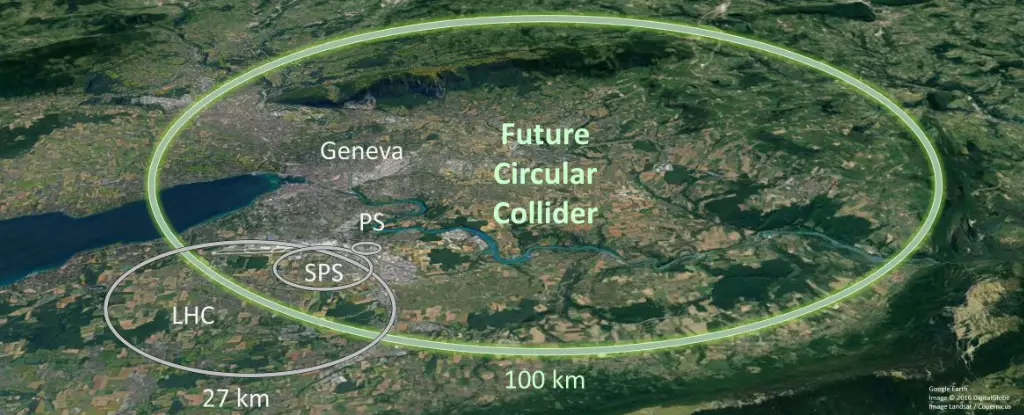As the world teeters on the brink of unprecedented scientific advancement, the announcement from CERN regarding the Future Circular Collider (FCC) has sparked a firestorm of debate. With a price tag rumored to eclipse a staggering $17 billion, the project’s ambition raises profound questions about the allocation of resources in an age overwhelmed by environmental crises and societal inequality. In a candid statement, CERN’s director Fabiola Gianotti has made it clear that European prestige in fundamental physics is on the line. She cites competition from China as a vital concern, emphasizing the urgency of the FCC project not only as a beacon of scientific progress but as a symbol of geopolitical dominance. However, this narrative of urgency clashes sharply with the tangible concerns of citizens and environmentalists who question the ethical ramifications of such immense financial expenditures.
A Colossal Ambition in a Troubling Economy
The FCC project represents an ambition so grand that it could dwarf not just CERN’s previous endeavors but also its most ardent critics. At 100 meters below ground and with a circumference exceeding 100 kilometers, its sheer scale is dizzying. Proponents argue that the project will allow scientists to plunge deeper into the mysteries of our universe, particularly the elusive Higgs boson. Yet, as the specter of financial constraints looms large, the major contributors—particularly Germany—are exhibiting trepidation. Are we, as a society, prepared to pour this level of funding into unguaranteed scientific returns while pressing social issues remain unaddressed?
Is it wise to gamble exorbitant public funds on a project with potentially unclear outcomes when the fabric of society is being frayed at the edges? Critics like physicist Olivier Cepas from the Neel Institute raise valid points about prioritizing smaller scientific endeavors that might yield more immediate benefits in various fields. The reality is that there are numerous less monumental projects that could require far less funding while providing valuable contributions to our understanding of the universe without overwhelming the taxpayer or the environment.
Community Impact: A Local Narrative
Beyond the buzzing world of particle physicists lies the crusty reality faced by ordinary citizens—specifically those resident in areas slated for development linked to the FCC. Take, for example, Thierry Perrillat, a dairy farmer whose livelihood may be disrupted by the demands of the FCC project. His poignant analogy of “David and Goliath” strikes at the heart of the issue: how do we reconcile monumental scientific ambition against the lives and livelihoods of local residents?
The voices of agricultural workers and eco-activists from organizations like WWF and Greenpeace should not be dismissed lightly. Their concerns echo a wider dissatisfaction with how projects of this magnitude often sidestep local realities for the sake of lofty scientific pursuits. The environmental and economic costs involved should make us pause and reconsider whether this is a worthy battle to fight. Addressing local opposition must be a priority; an initiative that bulldozes through community concerns under the banner of “progress” can only stoke resentment and resistance.
Environmental Conservation vs. Scientific Aspirations
Advancements in science often place individuals at odds with ecological well-being. Amidst the enlightening discussions about the potential discoveries afforded by the FCC, less glamourous but equally important considerations—like its ecological footprint—have received short shrift. Data showing the astronomical electricity consumption and possible climatic repercussions of the project cannot simply be handwaved away.
Local environmental groups have articulated a compelling critique of this “pharaonic” undertaking, marking it as an exercise in monumental excess. Would it be prudent to divert precious ecological resources toward a venture whose outcomes remain uncertain? As communities wrestle with climate challenges, is this the right time to inflate our pursuit of knowledge into titan-like proportions?
Competing Visions of Progress
The discussions unfolding around the FCC represent a broader conflict between different visions of progress. A sentiment emerges from proponents that without the FCC, Europe risks ceding its ground to burgeoning scientific initiatives elsewhere. Mayors like Daniel Raphoz frame the FCC as a boon for local employment and energy solutions, suggesting that CERN’s ancillary benefits may justify its monumental costs. This consideration, however, overlooks the immediacy of the pressing local needs that could find direct response in targeted funding for smaller projects that benefit both local economies and the world at large.
Are we truly prepared to let our long-term aspirations trample over our everyday responsibilities? The ongoing dialogue surrounding the FCC unfolds not just within the walls of scientific institutions, but in the minds and hearts of the communities it directly touches.
In balancing the promise of scientific advancement against the host of urgent social and environmental challenges we face, it becomes clear that the future of projects like the FCC should not be decided purely through the lens of ambition. The path forward demands a delicate balance, one that centers human and ecological well-being in the conversation around progress.



Leave a Reply